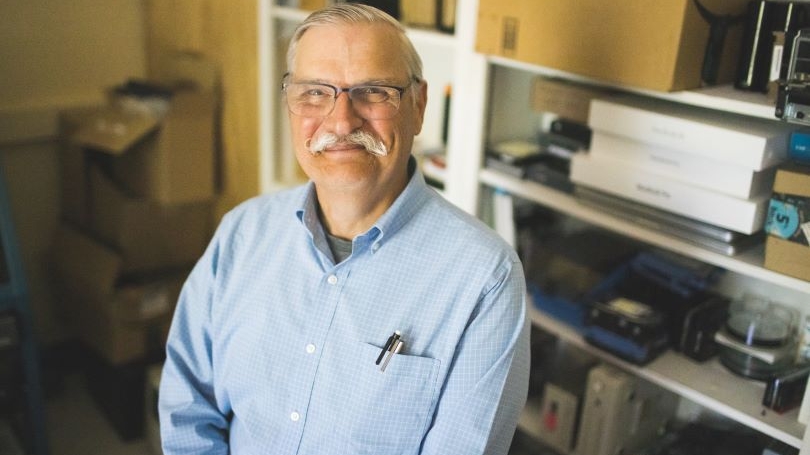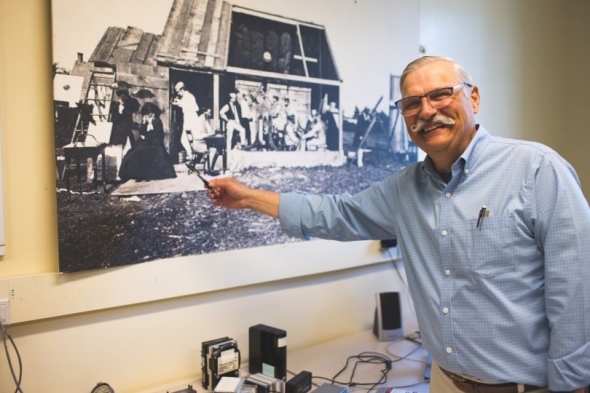

Systems engineer Terrence Kovacs will retire from Dartmouth this month after nine years as the physics and astronomy department's go-to IT expert.
Terrence Kovacs considers himself a "physics groupie."
"From astronomy to material science, I enjoy working with scientists and helping them," says Kovacs (who goes by "Terry"), a research systems engineer in the Physics and Astronomy department. "It gives me satisfaction knowing that I can help these intelligent people. And, I love to learn new things."
After nine years as the department's go-to IT expert, Kovacs will retire from Dartmouth at the end of June.
"Terry has been absolutely indispensable to the work in our department and the scientific discoveries we make," says professor and department chair Ryan Hickox. "A huge part of our research utilizes computers, and we often use complex, custom-built hardware and software that are designed for specific situations. It is often a challenge, but Terry keeps it all running, from helping first-year students get started with research to enabling data collection at remote locations from the South Pole to Arizona to Alaska!"
"I'm the plumber," Kovacs says modestly. "Much of the software used by scientists is written by other scientists. I connect things together and make them work—code that has been written in a variety of languages, such as Python, Fortran, C, PHP, Perl, and Bash."
When Professor of Physics and Astronomy Jim LaBelle needed a system to collect high-resolution frequency data from commercial AM radio stations for a research project, for example, Kovacs built a computer prototype that required no field configuration. After adding a disk drive, USB hub, and flash memory to the operating system, he uploaded various software packages and wrote custom C code to perform data collection and preliminary analysis.
Then Kovacs taught LaBelle's students how to build, load, and configure the software for an additional seven units which were deployed at locations throughout the Northeast. By not requiring field configuration, the systems save time and money, and are more reliable.
"Aside from setting up an external antenna, the systems are 'plug and play,'" Kovacs says. "They just need an ethernet connection and power."
The field units have been in use since 2017 and regularly 'call home' to deliver results to a computer at Dartmouth for further processing.

After earning a bachelor's degree in physics from Rensselaer Polytechnic Institute, Kovacs joined Bell Laboratories, where he supported the physical sciences division for 20 years. He holds two patents from this period.
In 2002, he and his wife decided to downsize and relocate permanently to their vacation home in Vermont. Kovacs worked as an IT contractor and supported engineers at IBM for nearly a decade. But, he says, he missed working with scientists. When he saw the job listing in the physics and astronomy department at Dartmouth, he immediately applied and was hired.
Looking back at his nine years at Dartmouth, Kovacs is struck by the growing diversity of his department. "Diversity has been a theme throughout my whole career," he says. "Dartmouth isn't just trying to appear diverse. The institution works very hard to find the very best people in each field."
"I will miss having Terry around," says Alan Goldblatt, the physics and astronomy department's manager of academic support. "He is always happy to help out with whatever comes up, is always cheerful, and is an interesting person to talk with. We often exchange stories about what we're doing with our personal projects on the side."
"We will miss many things about Terry, including his deep well of knowledge and his ready willingness to help with any problem or challenge that arises," Hickox says. "However, I think we'll mostly miss his warm, friendly presence in our department community, and of course his inimitable sense of style. We all hope he enjoys his well-deserved retirement."
This fall, Kovacs and his wife, Kathy, plan to cruise the Mediterranean, with stops including Venice and Rome. "We enjoy visiting museums, seeing new things, and sampling cuisine," he says.
Kovacs says that he will look back fondly on his time on campus.
"I have enjoyed working at Dartmouth," he says. "The people in my department have always been supportive and thankful for what I do."